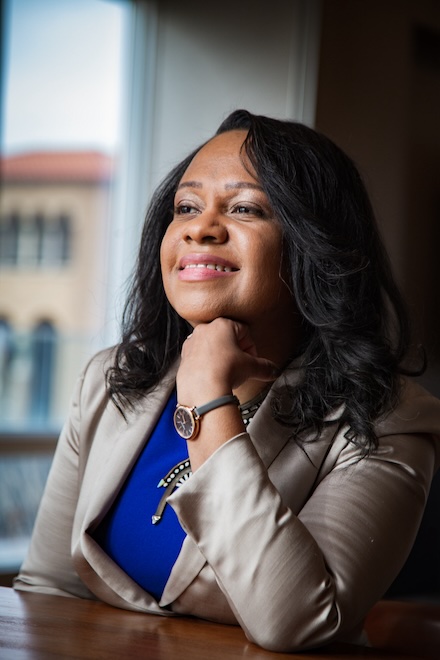(GREAT BARRINGTON, Mass.) — Ny Whitaker has been named executive director of the W. E. B. Du Bois Center for Freedom and Democracy (known as the Du Bois Freedom Center), following a seven-month, national search funded by a grant from the Andrew W. Mellon Foundation.
Whitaker will oversee operations, fundraising, and programming while reporting to the center’s board. She will work with project manager Eugenie Sills, who served as interim executive director until last spring, as well as Du Bois Forum director Kendra Field and the organization’s stakeholders.
A former White House senior advisor and New York University professor with more than 20 years of corporate, nonprofit, and public sector leadership experience, Whitaker will lead the transformation of the historic Clinton A. M. E. Zion Church into an African American cultural and heritage center dedicated to celebrating Du Bois in his birthplace.
According to a press release, as a nonprofit executive and strategic consultant, Whitaker has successfully implemented multi-million dollar fundraising and awareness campaigns for NYC Health & Hospitals Corporation, Ogilvy, and the Magic Johnson Foundation, and produced events for the United Nations and the Altman Foundation. Whitaker served as vice president of Programs & Sponsorship on the board of the Association of Fundraising Professionals – NY Metro Chapter, and has extensive experience in development, marketing, the creation of strategic partnerships, and building coalitions with elected officials and community organizations.
“I am honored to join the Du Bois Freedom Center and eager to work in partnership with its board, staff, volunteers, and the community, as we develop a space that elevates Black thought leadership and artistic expression, provides remembrance and recognition of the impact of African Americans on social movements, and highlights the immense contributions of Du Bois to our collective past, present, and future,” said Whitaker in a prepared statement.
Newly elected officers for the center include Dr. Christopher Himes, director of engineering and technology innovation at Miss Hall’s School (president/chair); Beth Carlson, principal of Silo Media (treasurer); and Johnathan Speer, associate dean of diversity, equity, and inclusion at Berkshire School (secretary).
Emeritus status was bestowed upon founding board members Wray Gunn, Sr. (emeritus president) and Cora Portnoff (emeritus director), both longtime Clinton Church members who previously held respective positions as board president/chair and secretary since the nonprofit’s founding in 2016.
“This is an exciting moment of growth for the Center, said Chris Himes, board chair, in a prepared statement. “With our new leadership, we are in a strong position as we enter the next phase of this project. We are closing in on our goals: to honor the legacy of Du Bois, the former Clinton Church, and the rich role of African American communities in this region and beyond.”
For 2024, the Du Bois Freedom Center will host Reflections on Democracy – a series of educational programs and public events that analyze the writings of Du Bois on this topic – in addition to the Du Bois Forum’s annual event.
According to Himes, the Mellon Foundation grant is also supporting structural and roof work as the Center completes its architectural and exhibition design phase.
The W. E. B. Du Bois Center for Freedom and Democracy (dba, the Du Bois Freedom Center) is dedicated to educating the public about the life and legacy of civil rights pioneer and NAACP co-founder, W. E. B. Du Bois. The 501c3 organization is restoring the historic Clinton A. M. E. Zion Church in downtown Great Barrington for adaptive reuse as an African American heritage site and cultural center with museum-quality exhibits and contemporary programming.
Built in 1887 by the A. M. E. Zion Society, the church was a formative influence in the life of W. E. B. Du Bois, who was born and raised in this rural New England town. The extant church, located at 9 Elm Court, served as the spiritual, cultural, and political hub of African American life in this southern Berkshire community until its closing in 2014.

